Data
from US and UK retailers shows that SSD or 'Flash' drive prices for use
in laptops or as a boot drive for desktops have halved, so that it's
now under $1 or £1 per gigabyte. It might be the fastest way to speed up
your PC
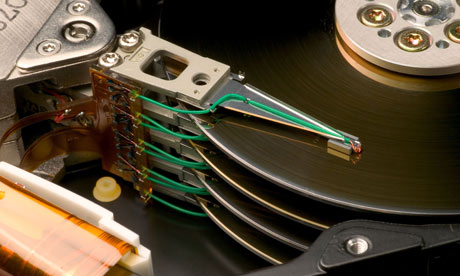
A magnetic hard drive: time to say goodbye? Photograph: Scenics & Science/Alamy
Price crash! And for once, it really is: prices of SSDs -
solid-state drives, aka Flash drives - with capacities large enough to
be truly useful as the boot drive of PCs have more than halved in the
past year, according to data from the US and UK.
Meanwhile in the UK data supplied to the Guardian by Dabs.com, the online retailer, shows that prices of HDDs (aka spinning hard drives) has rocketed by as much as 50% due to the floods in Thailand which devastated the country, killing hundreds and also destroying many factories where hard drives were assembled.
But at the same time prices of SSDs has continued to fall - so that in the UK they are now below £1 per gigabyte, the level previously thought of as marking the "affordability" level. In the US, many have fallen below the $1 per GB level.
According to data collected by Camelegg from the US online retailer Newegg, and analysed at Tech Report, SSD prices across the board have roughly halved in the past year, so that drives with capacities of 128GB or more are selling for less than $1.50 per gigabyte - and in a number of cases for less than $1 per GB.
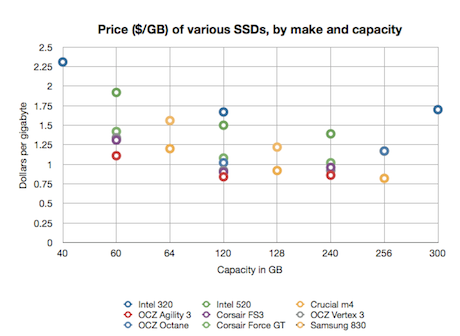
Meanwhile in the UK data supplied to the Guardian by Dabs.com, the online retailer, shows that prices of HDDs (aka spinning hard drives) has rocketed by as much as 50% due to the floods in Thailand which devastated the country, killing hundreds and also destroying many factories where hard drives were assembled.
But at the same time prices of SSDs has continued to fall - so that in the UK they are now below £1 per gigabyte, the level previously thought of as marking the "affordability" level. In the US, many have fallen below the $1 per GB level.
According to data collected by Camelegg from the US online retailer Newegg, and analysed at Tech Report, SSD prices across the board have roughly halved in the past year, so that drives with capacities of 128GB or more are selling for less than $1.50 per gigabyte - and in a number of cases for less than $1 per GB.

US retail SSD prices per gigabyte by capacity and make. Source: Newegg, via Camelegg
In the UK, data supplied to the Guardian by Dabs.com shows that
prices have fallen similarly, from an average of £1.49 per GB at retail
including VAT in June 2011, to just 71 pence per GB including VAT, based
on a range of devices from OCZ, Corsair, and Crucial.
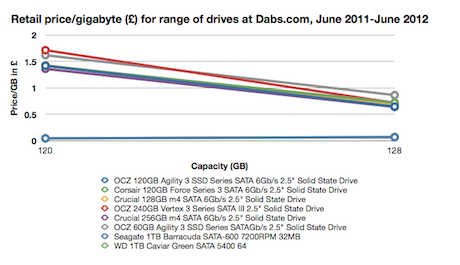

SSD prices at Dabs.com for the same capacity devices, June 2011-June 2012. SSDs are 120 and 128GB; HDDs 1TB.
The price differential between the two types of storage is also closing. We did tell you this was coming, in 2006.
At that time, 80GB counted as quite a big magnetic hard drive, and cost
around $50 at wholesale, while 32GB of Flash would cost $100.
In 2005, the price differential per GB between HDDs and SSDs was 33:1. By 2006 it was 19:1. With the latest figures from Dabs, even at retail the difference has shrunk dramatically, to just over 10 this year.
Even in January, when I compared the performance of a number of SSD drives with each other and with a hard drive, prices were £1.23 per GB for 256GB drives.
The Newegg data, analysed by Tech Report, shows a rapid erosion in prices for SSDs. Here's the data for Crucial:
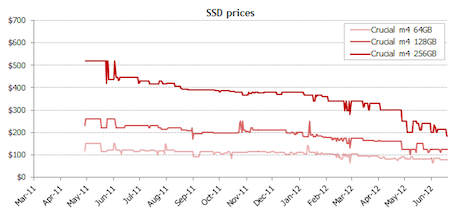
In 2005, the price differential per GB between HDDs and SSDs was 33:1. By 2006 it was 19:1. With the latest figures from Dabs, even at retail the difference has shrunk dramatically, to just over 10 this year.
Even in January, when I compared the performance of a number of SSD drives with each other and with a hard drive, prices were £1.23 per GB for 256GB drives.
The Newegg data, analysed by Tech Report, shows a rapid erosion in prices for SSDs. Here's the data for Crucial:

SSD pricing, June 2011-2012 for Crucial SSDs. Source: Newegg via TechReport
And now for Vertex:
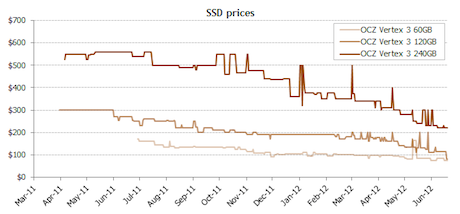

SSD prices June 2011-2012 for Vertex SSDs. Source: Newegg via TechReport
Duncan Rutherford of Dabs.com also points out that sales of SSDs have
increased rapidly, in some cases going up sevenfold (for products from
Corsair), while sales volumes for HDDs have dropped by 20-40% for some
makes.
That all adds up to a rapid changing of the guard: as SSD capacity ramps up, prices will continue to fall, although HDDs will continue to be the default option on non-premium devices, and desktops.
But Windows 7 has supported SSD since its arrival, while Apple is increasingly pushing users of its laptops towards SSDs; its latest "Retina Display" MacBook Pro is only available with SSD storage, as are the new version of its MacBook Air.
For those who are still using HDDs and want a rapid way to upgrade their computer - particularly a notebook - changing to an SSD is the fastest way to get a new experience. And the price fall now means that a like-for-like capacity swap may be possible, so that you don't have to delete or shift anything from your existing hard drive in order to fit into the SSD space. (Source)
That all adds up to a rapid changing of the guard: as SSD capacity ramps up, prices will continue to fall, although HDDs will continue to be the default option on non-premium devices, and desktops.
But Windows 7 has supported SSD since its arrival, while Apple is increasingly pushing users of its laptops towards SSDs; its latest "Retina Display" MacBook Pro is only available with SSD storage, as are the new version of its MacBook Air.
For those who are still using HDDs and want a rapid way to upgrade their computer - particularly a notebook - changing to an SSD is the fastest way to get a new experience. And the price fall now means that a like-for-like capacity swap may be possible, so that you don't have to delete or shift anything from your existing hard drive in order to fit into the SSD space. (Source)
Post a Comment